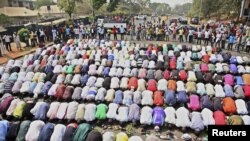ABUJA —
In the Nigerian city of Kaduna, which is known for sectarian violence, Muslims and Christians rallied together Friday against a common enemy: the anti-Islamic video that has sparked protests around the world. Religious leaders say they hate the video, but they are hoping it can help heal decades of violence between the two groups.
It’s been more than 10 years since the Kaduna neighborhood has seen violence between Muslims and Christians. Locals say that’s because Christians stay away to avoid danger. Muslims avoid other parts of the city for the same reasons.
Regardless, sectarian violence continues in many other parts of Kaduna, with nearly 100 people being killed in June.
But on Friday, religious leaders, both Christian and Muslim, marched together here, decrying a shared enemy and celebrating what they hope will be a step towards peace.
Abdulkareem Youssef, one of the organizers, says the issue hasn’t changed since mid-September when the protests erupted around the world after the YouTube release of a video, privately produced by an American, that desecrates Islam.
There was violence last month in Libya and Egypt, but protests in Nigeria have been peaceful. Youssef says protesters want to tell the world not to release similar material or else there will be violence here.
“We don’t want this to happen again. Otherwise, we will not take it easily to whoever, whoever tries to sabotage our prophet,” he said.
Most of the hundreds of protesters Friday were Muslims, chanting praise in Arabic for God and the Prophet. But Pastor Yohanna Buru is one of many Christian leaders who parked their cars in the normally Muslim-only neighborhood to march with the group, which was surrounded by dozens of armed guards.
He says they joined the protest out of solidarity, because both groups are against materials offensive to either religion.
Anger over the video, he adds, has presented an opportunity for Muslims and Christians to re-establish ties.
Preventative protesting is also a factor, he says, urging Christians to condemn the video, lest some Muslims accuse them of supporting it, which could cause another round of violence.
“We are supporting this demonstration today because we know it will bring peace. Because some of the Muslims, they don’t understand that we Christians are not supporting what they [the filmmakers] are doing,” stated Buru.
Kaduna is a “Middle Belt” city in the center of Nigeria and it's divided like the country as a whole, with mostly Muslims in the north and mostly Christians in the south.
Human Rights Watch says nearly 16,000 people have been killed in political or sectarian violence in Nigeria since 1999, and much of the bloodshed has been in the Middle Belt. Over 800 people were killed in Kaduna in 2010 alone.
Sectarian violence here is usually about politics, resources or revenge but the fights are almost always along ethnic and religious fault lines.
Ibrahima Yakubu contributed to this report from Kaduna
It’s been more than 10 years since the Kaduna neighborhood has seen violence between Muslims and Christians. Locals say that’s because Christians stay away to avoid danger. Muslims avoid other parts of the city for the same reasons.
Regardless, sectarian violence continues in many other parts of Kaduna, with nearly 100 people being killed in June.
But on Friday, religious leaders, both Christian and Muslim, marched together here, decrying a shared enemy and celebrating what they hope will be a step towards peace.
Abdulkareem Youssef, one of the organizers, says the issue hasn’t changed since mid-September when the protests erupted around the world after the YouTube release of a video, privately produced by an American, that desecrates Islam.
There was violence last month in Libya and Egypt, but protests in Nigeria have been peaceful. Youssef says protesters want to tell the world not to release similar material or else there will be violence here.
“We don’t want this to happen again. Otherwise, we will not take it easily to whoever, whoever tries to sabotage our prophet,” he said.
Most of the hundreds of protesters Friday were Muslims, chanting praise in Arabic for God and the Prophet. But Pastor Yohanna Buru is one of many Christian leaders who parked their cars in the normally Muslim-only neighborhood to march with the group, which was surrounded by dozens of armed guards.
He says they joined the protest out of solidarity, because both groups are against materials offensive to either religion.
Anger over the video, he adds, has presented an opportunity for Muslims and Christians to re-establish ties.
Preventative protesting is also a factor, he says, urging Christians to condemn the video, lest some Muslims accuse them of supporting it, which could cause another round of violence.
“We are supporting this demonstration today because we know it will bring peace. Because some of the Muslims, they don’t understand that we Christians are not supporting what they [the filmmakers] are doing,” stated Buru.
Kaduna is a “Middle Belt” city in the center of Nigeria and it's divided like the country as a whole, with mostly Muslims in the north and mostly Christians in the south.
Human Rights Watch says nearly 16,000 people have been killed in political or sectarian violence in Nigeria since 1999, and much of the bloodshed has been in the Middle Belt. Over 800 people were killed in Kaduna in 2010 alone.
Sectarian violence here is usually about politics, resources or revenge but the fights are almost always along ethnic and religious fault lines.
Ibrahima Yakubu contributed to this report from Kaduna





